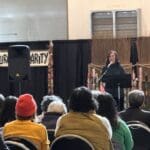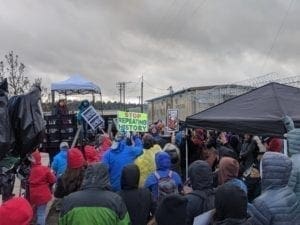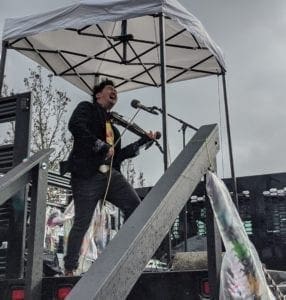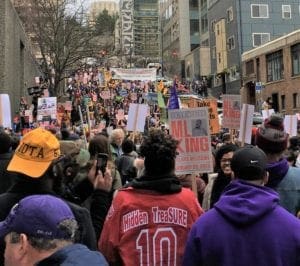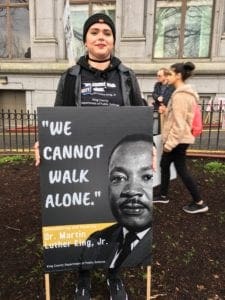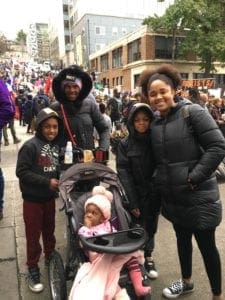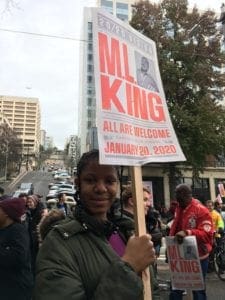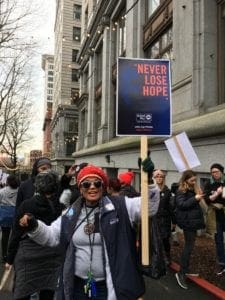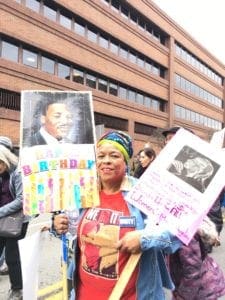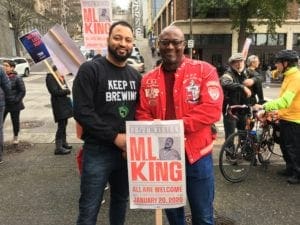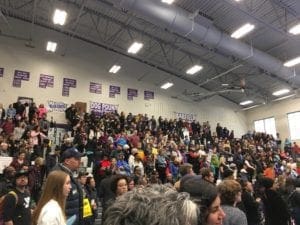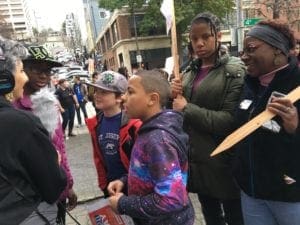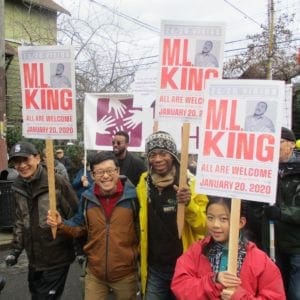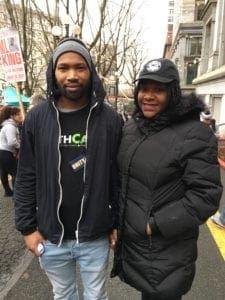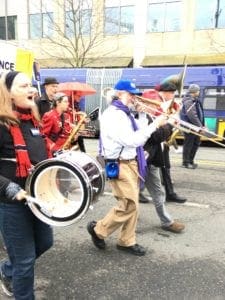A Day of Remembrance – A Week of Action
Each February, Japanese American communities nationwide observe the Day of Remembrance, the anniversary of the signing of Executive Order 9066 which led to the mass incarceration of over 120,000 Japanese Americans across the west coast during World War II.
Some survivors of this incarceration and their descendants fight mass incarceration today, because of their community’s experiences during that time. You’ll hear from Tsuru for Solidarity, an organization of Japanese American activists, and La Resistencia, a group advocating for immigrants detained today. Interviews are with Stan Shikuma, Co-chair of Tsuru for Solidarity’s children and family detention campaign and Maru Mora Villalpando, Founder of La Resistencia.
Producer: Yuko Kodama
Friday, February 16
9am
Press Conference
Federal Building 915 2nd Ave Seattle
Virtual Rally
Zoom bit.ly/3HWgwN4
Instagram Live @tsuruforsolidarity
Sunday, February 18
Program
1pm Washington State Fairgrounds’ Agriplex 5th St SW Puyallap
2:30pm Northwest Detention Center 1623 E J St Tacoma
Tuesday, February 20
10am
Press Conference
King County Airport Main Terminal 7277 Perimeter Rd S Seattle
Remember and Resist 2023
February 19, 2023 was the 81st anniversary of Executive order 9066. It ordered the forced removal and incarceration of over 120,000 people of Japanese descent from throughout the west coast.
In commemoration, an event was held at the Washington State Fair Events Center in Puyallup, Washington. The organizers were Minidoka Pilgrimage, JACL Seattle Chapter, JACL Puyallup Valley Chapter, La Resistencia and Tsuru for Solidarity.
Over 7,000 people were incarcerated in make-shift shelters and animal stalls on the fairgrounds in 1942 for about five months until the incarceration sites were completed.
The event also included a gathering at Tacoma’s Northwest detention center to support the detainees inside and call for an end to immigrant detention and deportations.
Listen in on the voices and sounds from Remember and Resist 2023.
Producer: Yuko Kodama
Photos: Widder Sessions
Who Helped When We Were Incarcerated
Producer: Gol Holghooghi and Yuko Kodama
Photo: Paul Tomita
(Audio story to be posted soon!)
Day of Remembrance Remember and Resist Event 2/19/22
Saturday, February 19, 10:00 am–1:00 pm
At 10 am, meet at the Puyallup Fairgrounds (Blue Lot Parking, 311 10th Ave SE, Puyallup, WA 98372).
At 11 am, we will move to the Northwest Detention Center (1623 E J Street, Tacoma WA 98421) for a continuation of the program starting at 12 pm.
Weather permitting, there will be some outdoor programming. Masks and social distancing required.
February 19, 2022, will mark 80 years since the signing of Executive Order 9066, which authorized the forced removal and mass incarceration of all Japanese Americans on the West Coast and beyond. Most Japanese Americans in the Seattle area spent their first few months in detention at the Puyallup Fairgrounds (“Camp Harmony”) until their transfer to the concentration camps at Minidoka, ID, and Tule Lake, CA. The trauma of family separation, child imprisonment, poor sanitation, bad food, inadequate health care, and uncertain futures persists—and continues today at the Northwest Detention Center (NWDC) in Tacoma.
Gathering in the same location where barracks once housed incarcerees, survivors, their families, and community members will share the history of Camp Harmony and personal experiences there, before rallying at NWDC to remember and resist the injustices of the past and present. The program will also include a live taiko drumming performance by Fuji Taiko and a special ceremony to remember Japanese American concentration camps and incarcerates.
For RSVP or information: info@seattlejacl.org
Notes: Dress warmly. There will be one porta-potty facility available on the Puyallup site. Feel free to
bring signs, tsuru and noisemakers for the Tacoma portion of the program!
The Circle: A Film on the Experience of Being Incarcerated
The Social Justice Film Festival is featuring The Circle, a film representing the artistic expression of people who are incarcerated. Two artists involved in this film, Allen Burnett and Marlene McCurtis spoke with KBCS about the genesis of the film and the lived experience behind it. The Circle can be viewed virtually through October 17th during the Social Justice Film Festival (more…)
Takeaways from Japanese American Stories of Incarceration
For the past 24 years, Tom Ikeda, the founding Executive Director of Densho and his staff have been conducting oral histories of Japanese Americans who have endured the painful experience of being forcibly removed from their homes and incarcerated en masse by the United States government.
Henry Miyatake’s Suitcase
Kendrick Glover
Kendrick Glover, the Executive Director and Founder of Glover Empowerment Mentoring (GEM) shares how his experience of being incarcerated with adults as a youth led him toward working on disrupting the school to prison pipeline. (more…)
Japanese American Elders Protest the Northwest Detention Center
Japanese American elders, their children and grandchildren, and many others held a protest at the Northwest Detention Center on Sunday, February 23rd. It was a partnership between Tsuru for Solidarity, Densho, Seattle Japanese American Citizens League and La Resistencia. This story looks at the generational impact incarceration has on families.
Tsuru for Solidarity is preparing for a pilgrimage on Washington DC from June 5 -7.
Full Story:
Many protesters gathered at Tacoma’s Northwest Detention Center, one of the largest ICE detention facilities in the nation. KBCS’ Sam Britt was there in heavy rain, and brings you this story.
I’m here at Tsuru for Solidarity’s Day of Remembrance and Action outside the Northwest Detention Center.
Despite the rain and the wind, before long, the streets outside of the Northwest detention center were flooded with people. huddled under umbrellas and tents surrounding the stage. Protesters activist and concerned citizens waited patiently for the events to formally begin. The crowd is filled with Japanese American elders that once faced incarceration by the United States, as well as the children and families of migrants that today face deportation or incarceration at facilities like the one here in Tacoma NW DC is one of the largest immigrant detention facilities in the country, owned and operated by the for profit corporation GEO Group. Inside, more than 1400 undocumented immigrants are housed, many of them for an undetermined period of time. The Japanese American group Tsuru for Solidarity organize the event today to protest the separation and incarceration of migrant families – something the Japanese community in the United States bears painful memories of.
James Arima: “I was born surrounded by barbed wire and guard cars in Crystal City, Texas. My father was separated from my mother and older siblings for almost three years. And I’m a product of the reunion. You know, and uh… I know that my father never recovered emotionally or economically from what was done to him. And my older siblings, people their age have memories of being incarcerated, but they claim they don’t. And I think it… it comes out in other ways from their suppressed memories. You don’t find them at events like this. I’m hopeful that someday they will because for many attending events like this it’s a healing.”
That’s James Arima, a survivor of the Japanese internment camps. He shared with me the lasting effects, discrimination and mass incarceration have had on him, his family and his generation growing up post World War Two. Dr. Satsuki. Ina is a Psychotherapist and founding member of Tsuru For Solidarity. She’s also a survivor of internment herself, and has devoted her life to studying the generational trauma her community still suffers with.
Can you describe to me your work and what you’ve discovered about group trauma,
Satsuki Ina: “Right. So, you know, collective historic trauma is something that has been inflicted on multiple groups of people of color in America. And particularly, my concern has been about children who are in this constant state of fear, separation, incarceration themselves, that when the nervous system and the brain is developing, to be in that state, actually alters physiologically, the brain functioning – so the child then grows up with a lot of anxiety and easily triggered defensive responses because of that. It’s influenced by culture too, so in my community, lots of anxiety and depression.”
And group trauma can touch more than just those who experienced the traumatic event. Its effects can be seen for generations to come. Mike, Ishii is a spoken word artist, and another founder of Tsuru For Solidarity, and the son of parents who went through the horrors of incarceration.
Mike Ishii: “What is confusing for us who were not incarcerated, but our descendants, is that we feel the trauma that was passed down through our parents to us. – and yet, it’s not happening, so you don’t understand why you have terrible anxiety, why you have panic attacks, why you lack confidence, why you feel so driven to have to do things perfectly, because after the war when they tried to come back into society, my family was targeted with violence. They shot our windows out, they spray painted death threats in front of the house. They would wait till my father left for work and they would call my mother and say, j*^ b#*@*, We’re going to come kill you now,”
And who was they?
Mike Ishi: “Our white neighbors and SeaTac”
…music…
There was pain here today. The now elderly children of incarcerated Japanese Americans remembered their loved ones lost, and the damage done to their families and communities. …And the still young children and wives of incarcerated migrants held by on the tall grey walls and barbed wire of the Northwest detention center remembered the faces of those they’d had taken from them.
There was also hope. Children folded paper cranes. Tsurus, in Japanese, a symbol for peace, compassion and hope. People played music beat drums, read poetry, chanted and remembered…Tsuru For solidarity is planning their largest action yet in Washington DC this June.
….music….
The violin you just heard was Kishi Bashi. I’m Sam Britt. Thanks to Yuko Kodama for help with editing.
Never Again Is Now Artwork to be featured at Bellevue College
Artist, Erin Shigaki, will be installing an art mural near the Bellevue College Main Campus Fountain today. The artwork is a wheatpaste of two children at a US government incarceration camp for people of Japanese descent during WWII.
Shigaki describes the art piece and why she chose this image for an installation.
Producer: Yuko Kodama
Photo: Purple Gate
Martin Luther King Jr. Day – Seattle March
Thousands took the streets in Seattle on Monday for the 38th annual Martin Luther King Jr Day March. KBCS’s Gol Hoghooghi and Yuko Kodama gathered sounds and interviews from the celebration.


